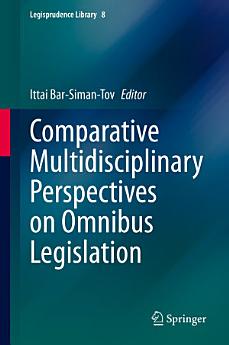Comparative Multidisciplinary Perspectives on Omnibus Legislation
About this ebook
A new, major and controversial reform is enacted in the middle of the night. It is buried in a massive omnibus bill hundreds of pages in length, which is rammed through the legislative process at breakneck speed. The legislators receive the final version of the bill in the very last minute, and protest that they’ve had no opportunity to read it in detail and know what they’re voting upon. The majority party’s legislative leaders, however, are unimpressed, and the law is eventually passed on the basis of strict party discipline.
Though it may sound far-fetched, this scenario is all too familiar in many legislatures around the world. The legislative practice of combining numerous unrelated measures in one long bill, which is often passed via a highly expedited process, has become a matter of intense debate and criticism in many countries.
About the author
Ittai Bar-Siman-Tov is an Associate Professor at Bar Ilan University Faculty of Law, where he also serves as co-director of the dual degree program in law and political science, and Head of BIU Innovation Lab for Law, Data-Science and Digital Ethics. He is also General Editor of the international journal The Theory and Practice of Legislation, and founding Co-Chair of the Israeli Association of Legislation. His scholarship has been published in leading journals (such as Georgetown Law Journal, Boston University Law Review, Regulation and Governance, and American Journal of Comparative Law) and received multiple awards and research grants.







